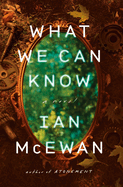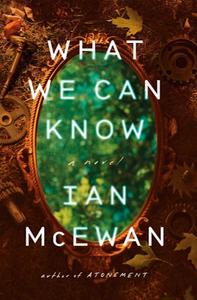
 At an age when many prominent authors are past the point of producing serious fiction that compares favorably with their best work, Ian McEwan (Atonement; Nutshell) stands as a noteworthy exception. The evidence to support that claim can be found in his novel What We Can Know, a psychologically acute story wrapped in a tantalizing literary mystery.
At an age when many prominent authors are past the point of producing serious fiction that compares favorably with their best work, Ian McEwan (Atonement; Nutshell) stands as a noteworthy exception. The evidence to support that claim can be found in his novel What We Can Know, a psychologically acute story wrapped in a tantalizing literary mystery.
The novel begins in 2119, in an England that's been transformed into an archipelago following a 2042 event known as the Inundation. Earth's population has fallen below four billion, clashing warlords vie for North American territory, and a dominant Nigerian empire controls the Internet. At a British university, Thomas Metcalfe, a humanities professor who specializes in English literature from 1990 to 2030, is obsessed with a poem entitled "A Corona for Vivien." The poem was a gift from eminent English poet Francis Blundy to his wife on her 54th birthday, which he read to a small group of friends attending a dinner party at their home. Written in Blundy's hand on vellum, it was never published, and the only known copy has vanished amid conflicting claims of its whereabouts.
Metcalfe's description of his search and of his frustration as the "biographer of the reputation of an unread poem" merges seamlessly with a subtly moving meditation on the struggle to preserve a collective memory of the best of civilization's culture on a climate-ravaged, economically diminished planet. But as the novel reaches its midpoint, he makes a discovery that propels the story in a radically different direction, confirming McEwan's confidence and skill.
As the author of the explosive memoir that comprises the second half of What We Can Know remarks, "there are occasions when prose must eclipse poetry." That observation couldn't be more apt to describe a story that encompasses the full range of human emotions and behavior--from profound love and compassion to the most fundamental of betrayals. At its heart is the recounting of a monstrous crime and the reverberation of that event through the lives of its perpetrators. McEwan spins out this account with an ease that will have readers finding themselves torn between the urge to race ahead to find out what happens next and the desire to linger to enjoy his eloquent prose and his astute, almost clinical dissection of his characters' behavior.
At every turn, What We Can Know satisfies expectations even as it generates fresh anticipation. Its keen insights about some of the darkest and most mystifying aspects of the human psyche are presented in the way one would expect from a novelist of Ian McEwan's experience and talent as he leads readers through the complex emotional labyrinth of this memorable story. --Harvey Freedenberg, freelance reviewer
Shelf Talker: In a post-apocalyptic England, a humanities professor seeking to solve a literary mystery discovers a tangled story of love and betrayal.

